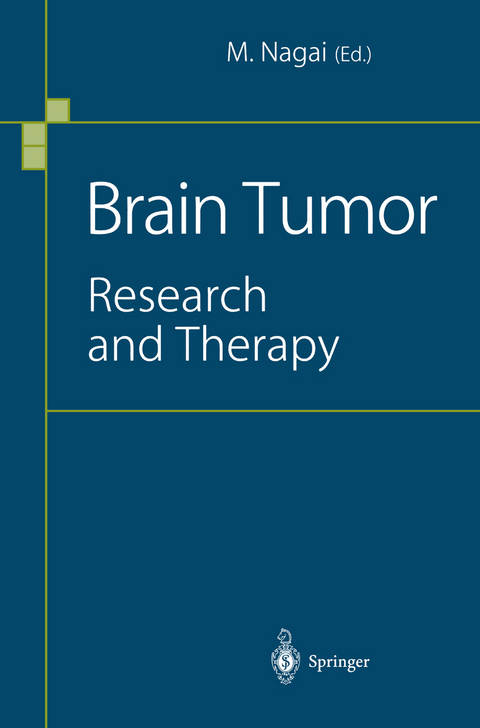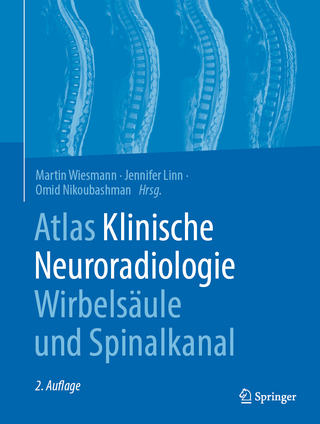
Brain Tumor
Springer Verlag, Japan
978-4-431-66889-3 (ISBN)
Histopathological Classification of Brain Tumors According to the Revised WHO Classification: Current State and Perspectives.- Histological Aspects of Certain Benign Brain Tumors: Review of Current Topics.- The Statistical Analysis of Prognostic Factors for Brain Tumors.- Evaluation of Histological Grading Systems of Astrocytic Tumors.- Histological and Radioimaging Study of Malignant Change in Low-Grade Astrocytoma.- Clinicopathological Study of Mixed Oligoastrocytoma.- Metallothionein in Gliomas.- Histological Grading of Meningioma Based on MIB-1 Immunoreactivity.- Incidental Meningiomas in Autopsy Cases in Computed Tomography and Magnetic Resonance Imaging Era.- Clinicopathological Study of Malignant Meningiomas.- Expression of L1 CAM in Brain Tumors: Immunohistochemical Study Using Anti-L 1 CAM Antibodies.- Expression and Biological Functions of L1 Cell Adhesion Molecule in Malignant Glioma Cells.- The Role of Urokinase-Type Plasminogen Activator in the Invasion and Proliferation of Malignant Brain Tumors.- Stemline Study Based on the Nuclear Characterization and Image Cytometry in Resected Brain Tumors.- Efficiency of Glioma Score in Glioma Patients Using Proliferating Potential with MIB-1 Monoclonal Antibody.- Molecular Analysis of Phosphorylated Tyrosine-Binding Proteins in the Transduction of Proliferation and Differentiation Signals.- Gene Alterations in Glial Tumors.- A Model for the Molecular Pathogenesis of Astrocytic Gliomas.- Molecular Genetics of Oligodendroglial Tumors.- The Correlation Between fig Gene Expression and the Progression of Glioma.- Expression of trk Proto-Oncogene Product in Medulloblastoma.- Differential Expression of FGF Receptor-1 and FGF Receptor-2 Is Associated with Malignant Progression of Gliomas.- Point Mutations of Epidermal GrowthFactor Receptor Transcripts in Primary Human Malignant Gliomas.- Expression of Vascular Endothelial Growth Factor in Human Brain Tumors In Vivo.- Studies of Retinoblastoma and p53 Gene Mutations in Human Astrocytomas.- Immunohistochemical Assessments of P53 Protein Accumulation and Tumor Growth Fraction During the Progression of Astrocytomas.- Homozygous Deletion of the p16 Gene in Malignant Glioma.- Detection of Binding Proteins of Merlin, the NF2 Tumor Suppressor Gene Product.- Mutations and Loss of Heterozygosity of the von Hippel-Lindau Tumor Suppressor Gene in Sporadic Central Nervous System Hemangioblastomas.- Anti-Fas Antibody Induces Apoptosis in Cultured Glioma Cells by Activation of the Sphingomyelin Pathway.- Induction of Apoptosis in Malignant Glioma Cells by Anti-Fas Antibody.- Monocyte Chemoattractant Protein-1 (MCP-1) Derived from Brain Tumors: Its Significance and Clinical Application.- Experimental Analysis of Proto-Oncogene and Histocompatibility Antigen Gene Expression During Brain Tumor Progression.- Suppressed Expression of T-Cell Costimulatory Molecules B7 and B70 in Human Glioblastomas In Vivo.- Clinical Trials with Interferon-Alpha as a Chemosensitizer in Gliomas.- Evaluation of Interferon Therapy on Malignant Gliomas.- Clinical Results of Specific Targeting Therapy Against Patients with Malignant Glioma.- Structural Analysis of Anti-Cancer Antibody, CLN-IgG and Anti-Idiotypic Antibody, Idio-No.3, for the Study of Idiotope Image Transmission: An Insight into Antigen-Specific Human Monoclonal Antibody Therapy.- Clinical Effect of CLN-IgG on Glioma and Its Correlation with the Induction of Antianti-Idiotypic Antibody in the Serum.- Gene Therapy for Central Nervous System Tumors.- Application of the Apoptotic Gene to Gene Therapy of Malignant Gliomas.- Experimental Therapy for Malignant Brain Tumors Using Genetically Engineered Herpes Simplex Virus Type 1.- Investigations of Retroviral-Mediated Gene Therapy for Malignant Glioma: Transduction with HTK-Bearing Retroviruses Sensitizes Glioma Cells to Ganciclovir.- Cytokine Gene Therapy of Malignant Glioma by Means of DNA/Liposomes.- Analysis of sdi-1 Gene Functions in Human Malignant Gliomas.- Antisense DNA Approach to the Growth of Human Glioma Cells.
| Erscheint lt. Verlag | 17.8.2012 |
|---|---|
| Zusatzinfo | XIV, 456 p. |
| Verlagsort | Tokyo |
| Sprache | englisch |
| Maße | 155 x 235 mm |
| Themenwelt | Medizinische Fachgebiete ► Chirurgie ► Neurochirurgie |
| Studium ► 2. Studienabschnitt (Klinik) ► Pathologie | |
| ISBN-10 | 4-431-66889-6 / 4431668896 |
| ISBN-13 | 978-4-431-66889-3 / 9784431668893 |
| Zustand | Neuware |
| Informationen gemäß Produktsicherheitsverordnung (GPSR) | |
| Haben Sie eine Frage zum Produkt? |
aus dem Bereich


